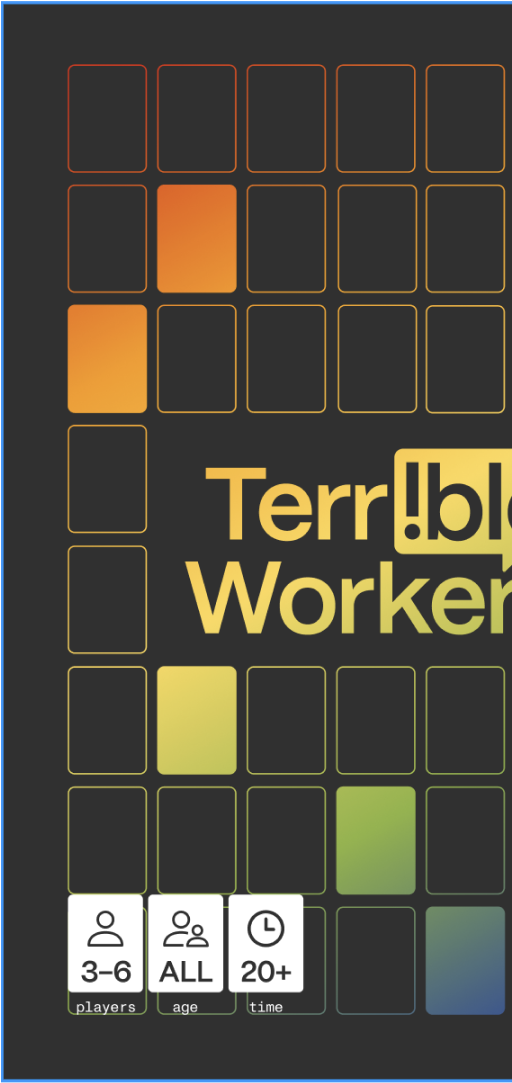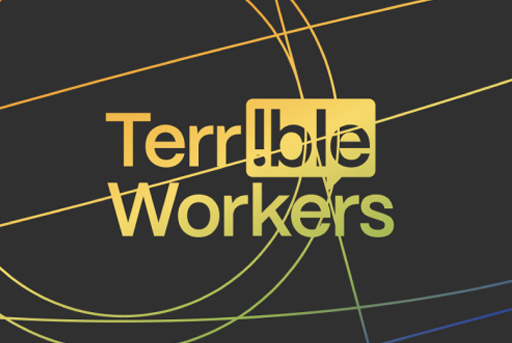Terrible Workers
A humorous and thought provoking game where you can sabotage your friends and rise to the top! Prove your worth as the best (or least terrible) worker in this fast-paced card game.
Terrible Workers is a game we designed that demonstrated our heuristics. The game encourages students to bring out the best version of themselves by pitching to be hired for diverse kinds of jobs (vice president or even a pirate!). This fictional scenario ensures enough psychological distance from daily life to create a low stakes and fun environment to engage in active thinking and self reflection. Raising their awareness of people skills is the first step to students actively practicing and getting better at. Terrible Workers is sure to bring out playful competition, social connection, excitement and lots of laughter!
As a parent, teacher or educator, you can choose to lead a small discussion in class after the gameplay on what each student thought the goal of the game was. The different interpretations and perspectives that students bring to the conversation will promote a rich learning experience. Refer to the guides section for more tips on how to facilitate the discussion!
Give teens freedom and autonomy
Create distance from daily life
Give teens freedom and autonomy
Create distance from daily life
Give teens freedom and autonomy
Create distance from daily life
Give teens freedom and autonomy
Create distance from daily life
Intended Learning Outcome
- Bad interpersonal traits can overshadow good technical skills
- People will choose to work with you for your interpersonal skills over your technical skills, or at least it will be a combination
- Picture of you is incomplete with just technical skills. Interpersonal traits also make up who you are
- Strengths and weaknesses can co-exist and that’s normal
- Exposure to different types of interpersonal skills
Student’s Point of View
- Awareness of difference between interpersonal traits and technical skills
- Communication skills: debate, improvisational speaking, persuasion and interview skills
-
Perspective taking: understanding what “positive qualities” mean to different people
Collaboration: discuss with others -
Leadership: recognize leadership qualities
Decision making and business skills: marketing, advertising skills - How to self advocate: pitching yourself and self-advocating is important, understand how to make ourselves stand out of the crowd
- Reframe negative traits in a growth mindset: negative traits and weaknesses should not bring you down, can get better at it and spin it in a positive way
- Self confidence: how you present yourself is up to you, you should not be brought down by other’s perception of you. pitch yourself to the best with what you have and who you are
Prepare cards, form groups
- Prepare card sets based on class size.
- Initially, let children play with familiar friends. Once they grasp the rules and enjoy the game, mix groups with less familiar classmates.
Listen in!
- As mentioned in our heuristic, refrain from immediately discussing the educational significance of the game.
- Feel free to play with the students, but be aware that the fun often involves the “throw shade” aspect, and your participation might affect their comfort level.
- Listen to students’ pitches to use them as examples during the later discussion.
Guide discussion, watch for nuanced changes
- After the play session, ask students their takeaways from the game. The teacher can then express their viewpoint, being attentive to differing perspectives.
- Avoid assigning written reflections or formal discussions and refrain from grading them. Associating the game with school work may lead to resistance in future classroom activities or games.
- Interpersonal skill development is slow and challenging to measure. Multiple gameplays aim to foster students’ recognition of the importance of interpersonal skills and encourage ongoing development.
- Methods exist to measure short-term impact of a single game on students. Refer to the research report on the resource page for detailed research methodology and data.















